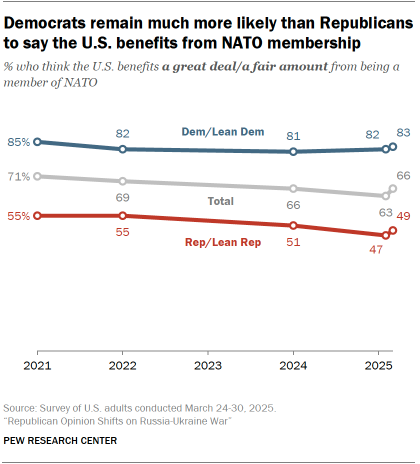Here are several key takeaways about Americans’ assessments of NATO:
- While a majority of Americans (60%) express a positive view of NATO, there continue to be partisan differences: 77% of Democrats have a favorable view of the international alliance, compared with 45% of Republicans. These views have not moved significantly over the past year.
- More Americans say the U.S. benefits from membership in NATO (66%) than say it does not (32%). Democrats are much more likely than Republicans to say the U.S. benefits from NATO membership.
NATO favorability
Six-in-ten U.S. adults have a favorable view of NATO, similar to the share who said this in 2024. Another 37% have an unfavorable view of the alliance.
Partisanship
For several years, there has been a wide partisan gap in U.S. opinions of NATO. About three-quarters of Democrats and Democratic-leaning independents (77%) express a positive view of the organization, while 45% of Republicans and Republican leaners feel this way. Neither partisan group has shifted significantly in their views over the past year.
There are ideological differences in these views within both partisan coalitions:
- Moderate or liberal Republicans (51%) are more likely than conservative Republicans (41%) to express a positive view of NATO.
- Liberal Democrats are more likely than conservative or moderate Democrats to have a favorable opinion of the alliance (85% vs. 72%).
Does the U.S. benefit from NATO membership?

About two-thirds of Americans (66%) say the U.S. benefits a great deal or a fair amount from being a member of NATO, while 32% say it does not benefit much or at all.
The share who say the U.S. benefits from NATO membership has increased modestly from 63% in February 2025, and is the same share who viewed membership favorably in spring 2024.
Partisanship and change over time
About eight-in-ten Democrats (83%) believe the U.S. benefits from being a member of NATO, compared with about half of Republicans (49%). Liberal Democrats are particularly likely to say the U.S. benefits from membership in the alliance (90%), while a 57% majority of conservative Republicans say the U.S. does not benefit much or at all.
The share of Republicans who said the U.S. benefits from being part of NATO has dropped since we first asked this question in spring 2021; at that time, 55% saw at least a fair amount of benefit to NATO membership. Democrats’ views have not changed much since then.
Views of international engagement and Russia
U.S. adults who say the country should be active in world affairs (81%) are more likely to think the U.S. benefits from being a member of the alliance than those who prefer the country pay less attention to problems overseas and instead focus on domestic issues (52%).
And those who say Russia is an enemy of the U.S. (72%) are more likely than those who see Russia as a competitor (49%) or partner (44%) to have a favorable view of NATO.




